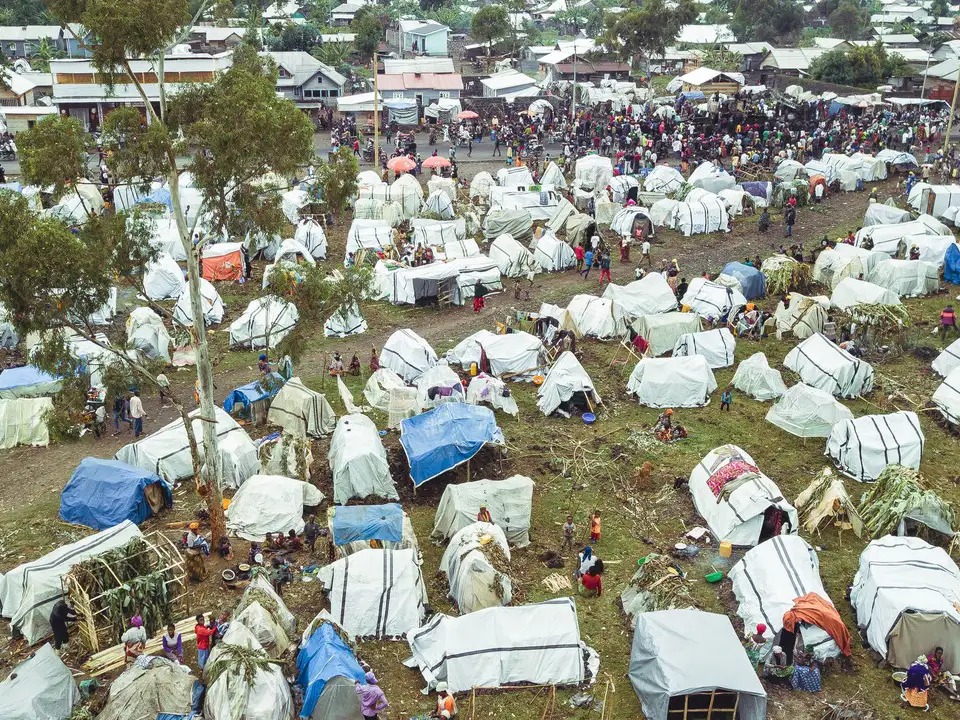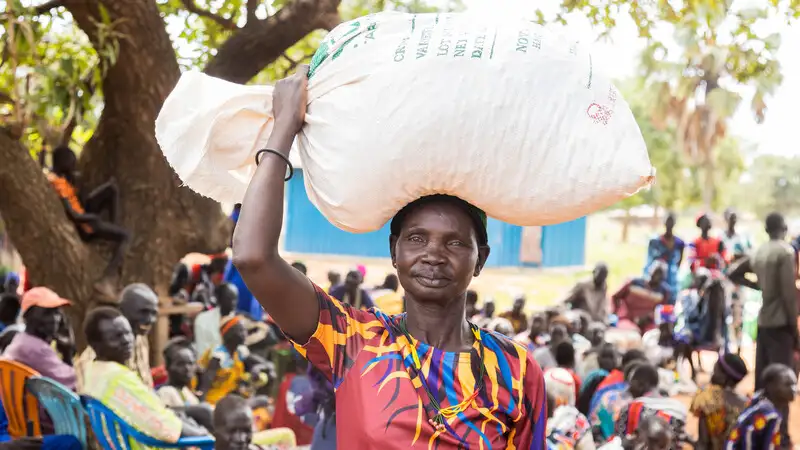

Conflict, poverty and climate change drive millions of people to leave their homes seeking safety in temporary shelters.
CAFOD answers your questions about the global refugee crisis and how CAFOD is responding.
What is the refugee crisis?
There are more people on the move than ever before. Every minute, 30 people around the world are newly displaced. Half of the world’s refugees are children and thousands take flight without the protection of parents or other family members.
Most people on the move are from poor countries, and most seek safety in nearby developing countries or within their own country’s borders. The communities who welcome them are often struggling to survive themselves.
Forced to leave behind jobs, personal belongings and loved ones, vulnerable people fleeing conflict and poverty urgently need shelter, food and water.
World Refugee Day
Each year on 20 June, the world celebrates World Refugee Day - a day to honour refugees around the world who show strength and resilience as they are forced to flee their homes.
This year, the theme of World Refugee Day is 'home away from home', finding ways to be more inclusive towards refugees in our communities. Every person has a right to a home and to feel welcomed and accepted – whoever they are, wherever they come from and whenever they are forced to flee. Pope Francis has called on us as Catholics to welcome migrants and refugees with arms wide open.
How is CAFOD responding to the global refugee crisis?
The Church is at the forefront of welcoming, protecting and integrating refugees and migrants throughout the world. We are a member of Caritas Internationalis - a confederation of Catholic aid agencies across the globe. Here are just a few of the countries where CAFOD is providing support for refugees:
Ukraine - Through our international partner Caritas, we are working inside Ukraine and on its borders to support people who have been forced from their homes by the conflict, setting up safe centres with beds, food and washing facilities. We’re also providing transport, information, psychological support and child-friendly spaces.
Afghanistan- Nearly 6 million Afghans have been driven out of their homes and their country by conflict, violence and poverty with majority escaping to Pakistan and Iran. CAFOD is working with local partners distributing food, cash vouchers and toolkits, supporting Afghans with a reliable way of earning an income.
Colombia - A decades-long armed conflict has resulted in the second highest number of people forced to flee their homes in the world. CAFOD partners provide practical support and help people who have lost their homes to speak up for their rights. We are also supporting Venezuelans who have been forced to flee their homes and crossed the border into Colombia.
South Sudan - Over a million South Sudanese have fled civil war to take refuge in Uganda. Caritas Uganda is helping provide food, water and shelter.
Sudan - Conflict has broken out in Sudan, and hundreds of civilians have been caught up in the violence. Our local experts are supporting refugees who are crossing the border into South Sudan.
Bangladesh - Since 2017 more than 700,000 Rohingya refugees have fled to Bangladesh, escaping violence in Myanmar.
Kenya - Kenyan Bishops have been active and outspoken on refugee issues. The Holy Cross Catholic parish in Kakuma is the only one in the world that operates inside a refugee camp.
Lebanon and Jordan - CAFOD works with Palestinian, Iraqi and Syrian refugees, training young people for employment, encouraging children to play, and providing safe spaces for those who have suffered trauma.

Refugee and Conflict Fund
Your donations towards our Refugee and Conflict Fund will help reach vulnerable people fleeing conflict and poverty all over the world.
Why has CAFOD campaigned for the rights of refugees and migrants?
War, persecution, natural disaster and poverty force millions of people from their homes.
As a development charity, CAFOD campaigns to tackle poverty and injustice. We have been campaigning for refugees and migrants to be protected and treated with dignity because they are often among the poorest and most vulnerable.
People who are already vulnerable – including women, children, the elderly or disabled people – are the ones who face the greatest hardship when they leave their homes. They need special protection.
We are also inspired by Pope Francis, who has challenged world leaders to do more for the protection of refugees and migrants.
The Catholic community in England and Wales has already shown its desire to reach out to refugees and migrants, through practical support and prayer. In 2016, over 40,000 adults and children sent messages of hope to refugees, inspired by the Lampedusa cross. In 2017, the Catholic community of England and Wales walked over 100,000 miles in solidarity with people forced to flee.
What are the UN compacts on refugees and migration and what difference will they make?
In 2018, world leaders adopted two new global ‘compacts’ (or agreements) at the United Nations: one on refugees and one on migration.
These UN compacts are important because they set the direction on how countries will respond to migrants and refugees for years to come.
Pope Francis has spoken of this as a "unique opportunity" for Catholics to put pressure on governments who are not yet stepping up to the challenge of unprecedented global migration. This is our chance to make sure the human dignity of migrants and refugees is at the heart of these agreements.
What is Pope Francis's view on the refugee crisis?
Pope Francis has been outspoken on the issue of refugees and migrants. In 2021, on the World Day of Migrants and Refugees, Pope Francis made an "appeal to journey together towards an ever wider “we” to all men and women, for the sake of renewing the human family, building together a future of justice and peace, and ensuring that no one is left behind.”
In his first visit outside Rome as Pope he lambasted the "globalisation of indifference" on the island of Lampedusa where thousands of migrants landed. On a visit to Kenya in November 2015, Francis said the world's response to the refugee crisis would be "a test of our humanity".
Pope Francis has challenged world leaders to do more for the protection of refugees and migrants. Francis insists that migrants and refugees should be helped and treated with respect at every stage of migration. This includes the point of departure and the journey across borders. It also includes helping people who have arrived in host countries.
The department on migrants and refugees at the Vatican has released guidance on behalf of the Pope for governments called 'Responding to Refugees and Migrants: Twenty Action Points'. The action points in this document lay out specific proposals from the Church for governments to consider. The Share the Journey campaign demands are drawn from these points.
Pope Francis launched the Share the Journey campaign embracing migrants during his weekly audience in St Peter’s Square on 27 September 2017. He opened his arms in a gesture of welcome and said, "Hope is the desire to share the journey of life, as the Caritas campaign that we inaugurate today reminds us. Brothers and sisters, do not be afraid to share the journey! Do not be afraid to share hope!"
In 2018 CAFOD campaigned on the refugee crisis through our Share the Journey campaign.
What is the position of the Catholic Church in England and Wales on refugees and migrants in Europe?
CAFOD’s mandate from the Bishops’ Conference of England and Wales is to support poor communities overseas. CSAN (the Catholic Social Action Network) is the social action arm of the Catholic Church for work in England and Wales. Their members support refugees who have already arrived in the UK, and they do advocacy work on poverty in the UK. Together, CAFOD and CSAN form Caritas England and Wales. Both organisations supported the Share the Journey campaign.
“The refugee crisis is a huge challenge, not only in Europe and the Middle East, but in many others parts of the world where large numbers of refugees live deeply uncertain and perilous lives. Consequently, as a Catholic community, and as a country, we need to be committed to helping refugees over a long period. To sustain that effort we need moral imagination.”
Should the UK government accept more refugees?
CAFOD, alongside other agencies, has consistently called on the UK government to accept more refugees from Syria, Afghanistan and any other country where lives at risk - including women and children at risk of sexual violence, disabled people, and people who need urgent medical and psychological support.
On Syria - while we welcome the Prime Minister’s pledge to take 20,000 Syrian refugees under the Vulnerable Persons Relocation Scheme over the course of this Parliament, we are calling for real urgency in the government’s actions. Vulnerable Syrians don’t have 3-5 years to wait to be granted a humanitarian visa in the UK. We need the government to take steps to speed up the process of identifying and offering relocation to Syrians in the region and to ease the burden on neighbouring countries in the Middle East.
In January 2016 CAFOD, along with 25 other British NGOs, wrote a joint letter to the Prime Minister making the following points:
“We therefore join leading members of the legal community in endorsing the following four refugee principles and believe that, as a matter of urgency:
The UK should take a fair and proportionate share of refugees, both those already within the European Union and those still outside it.
Safe and legal routes to the UK, as well as to the European Union, need to be established.
Safe and legal routes within the European Union, including the UK, should be established.
There should be access to fair and thorough procedures to determine eligibility for international protection wherever it is sought.”

